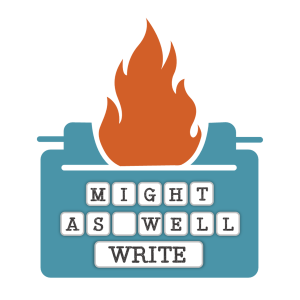Quoth Tom: How do you keep your larger writing projects organized? Do you use Word, notebooks, sticky notes, or some other tool, like Scrivener or Ulysses to keep everything straight (characters, plotlines, etc.)? My larger writing projects eventually turn into a tangle, which often become a chore, instead of a joyful, creative exercise.
Yay! A question about tools. I love talking about tools because every single tool holds within it the promise that FINALLY, writing will be easy.

I’ve tried writing in a million different ways, and what’s working for me now is this odd combination of things:
- Writing the initial lines, scenes, or even chapters of a work in Word, a plain text editor (like Sublime Text or even Evernote), or by hand with my twee fountain pen in a journal.
- Each time I return to that work, I read a little of what came before, tinker with a few things, and then ride that momentum a little further.
- In general, I try to write the story in order, though sometimes I’ll think of a dramatic moment and write it at the very end of the document.
- Eventually I get stuck, at which point I either write by hand in a journal or type in a blank document, “What the fuck is going wrong here?” and then I answer my own question until I feel a sudden spark of recognition and jump back to the main file.
- If a story grows beyond my ability to remember names or places, I’ll often create a secondary document (or a heading way at the bottom of the main one) where I list out things I need to remember.
- Sometimes, the sheer weight of stuff I’ve already written intimidates me so I’ll do the day’s writing in a file I call “workbench.docx,” working on the next small specific bit which I’ll then paste back into the main document.
That sounds really complicated, and at least one writer reading this is thinking, “But Scrivener can do all of that for you AND massage your [preferred flesh or appendage]!”
I’ve used Scrivener and done well with it, but I’ll admit that it feels very portentous when I open it, like somewhere I’m blasting a trumpet and crying, “TODAY I AM WRITING IN THE APPROVED TOOL FOR DOING SO!” That node structure on the side of Scrivener with all those folders and scenes and index cards and character sketches just looms in my imagination, even when I hide it.
(I am a total fucking weirdo, though.)
I need as little as possible between me and the next blank page, and for 90% of my writing process, I’m happily chugging along in Step 2 above using Word.
Given the question you’re asking, though, I would say that something like Scrivener (which now has a Windows version as good as its Mac one) is almost certainly what you need. You can include images and notes and videos, and it’s all nicely organized.
My caution for you, though, is this:
The less that stands between you and the words on a page, the better.
In much the same way that you’d, say, treat someone’s cancer, I’d start with simpler interventions before going full-on chemo. Some of those simpler interventions might be:
- Writing in a single Word document using the Heading 1 style to break it into sections or chapters. Then you can open View > Navigation Pane and go immediately to any heading. Maybe those headings could be “Characters” or “Maps” or “Random Shit I Don’t Know Where to Put Yet.”
- Writing in one document for the prose and another for notes. That might also be a physical notebook or folder.
- Trying a product with a similar idea as Scrivener but executed a little less like the cockpit of a 747, like Novlr.org. It’s cloud-based, has a simple interface, and gives you all the organization you’ll likely need. Dabble also looks interesting, and so does Living Writer.
- And if you need it, by all means dive headlong into Scrivener. Sometimes you’ve got a big enough lawn to need a tractor, and there’s no question Scrivener is heavy duty.
(Someone at Literature and Latte is thinking, “So do we link to this as an endorsement or what? This fucker is all over the place.”)
The reason I propose this escalating series of tools is because it’s so easy to get mired in finding the perfect one or spending way too much time setting it up or mutating your work to fit the tool instead of the other way around.
As my friend and mentor Jeffrey Ford often puts it, “What am I, a fucking bricklayer?”
At the crux of it all is finding the tool that will get out of the way of your creativity while enabling it. That will require some experimentation and some open-mindedness. You may well work best with a deck of index cards or sticky notes.
Robert Pirsig wrote Zen and the Art of Motorcycle Maintenance in this heavily-fucked up Apple II. George R.R. Martin still writes in WordStar 2.0 in DOS, which seems to jibe with the modernity of some of his other views. Hunter S. Thompson gonzo-ed by spelling out each word with rounds from a .357 in sheets of plywood. Henry David Thoreau pontificated Walden in, like, sheep’s blood or Google Docs or something.
In each of those cases, they wrote until they get stuck and then found the simplest tool to get unstuck. Your instinct to follow what’s still fun and easy is a good one, and as you accumulate a large box of tricks to save your bacon, always choose the one that’s energizing instead of exhausting.
Scrivener can help! But then, so could amphetamines. Who am I to judge?
